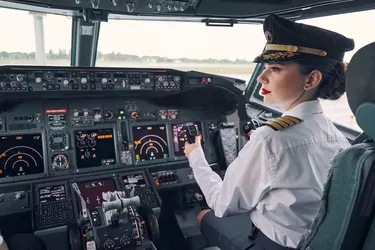
The large, wide and familiar Boeing 747 plane symbolizes power, freedom and modern air transportation. Being at the helm of one is no easy task, but the money can be good. How much does a pilot make when behind the wheel of one of these beauties? The salary depends on the pilot's rank (captain or first officer), years of service and the airline. United and Delta operate these planes, as do a certain number of cargo airlines.
How Much Does a Pilot Make in a Year?
Video of the Day
The U.S. Bureau of Labor Statistics reports that airline and commercial pilots earned a median pay of $134,630 a year in 2021 flying planes, helicopters and other kinds of aircraft. A United pilot salary for a captain could start at $177 an hour for a first-year captain and increase to as much as $190 an hour by 12 years. A Delta airline pilot salary for flying a 747 is also based on seniority and is estimated to range from $199 to $217 an hour. A UPS pilot salary can be even higher and is estimated to be as high as $252 an hour.
Video of the Day
First officers are second in command, work under captains, act as co-pilots and make less money. With United, these employees start at about $33 an hour and can work their way up to $148. Delta shows higher pay rates, ranging from $56 to $148 an hour, and UPS first officers get approximately $178 an hour when they have 15 years of flying experience with the company.
Other Kinds of Pilots
Commercial aircraft pilots also fly planes for other purposes, like traffic monitoring, emergency rescues and evacuations, aircraft testing, firefighting and crop dusting. While commercial airlines use two-person teams to pilot their fights, smaller companies might hire one pilot to fly their planes. However, working for a larger airline can come with higher pay and better benefits. Most of these pilots get a per diem allowance for their time away from home plus paid time off, health care coverage and free flights for family members.
There were 113,900 airline and commercial pilot jobs in 2020, and this field is projected to grow by 13 percent from 2020 to 2030, which is faster than average. It is expected that there will be 14,700 jobs at the end of that time. The job training is moderate, and as long as the travel, leisure and delivery industries are up and running, things should continue to keep going up.
Pilots and Taxes
Airline and commercial pilots may be able to deduct job-related expenses when their employers don't reimburse them. These might include license fees, passport or visa fees, training costs, union dues and the price of a uniform that is only worn at work. A pilot's travel expenses may also qualify as deductions when they are paid out of pocket for transportation to the airport or a hotel as well as lodging and meals.
Other expenses, like internet fees, out-of-town ATM fees, small travel toiletries and even a new travel case might qualify as long as the pilot only uses them for work purposes. It makes sense to save all of the receipts and to keep track of what they were for. These employee expenses can be claimed on a Schedule A when tax time rolls around. Tax-filing pilots must follow plenty of IRS rules to do this correctly, and not all expenses will qualify for these deductions. For additional information about what airline pilots can and cannot claim as an expense on taxes, you should refer to the resources provided by the IRS.